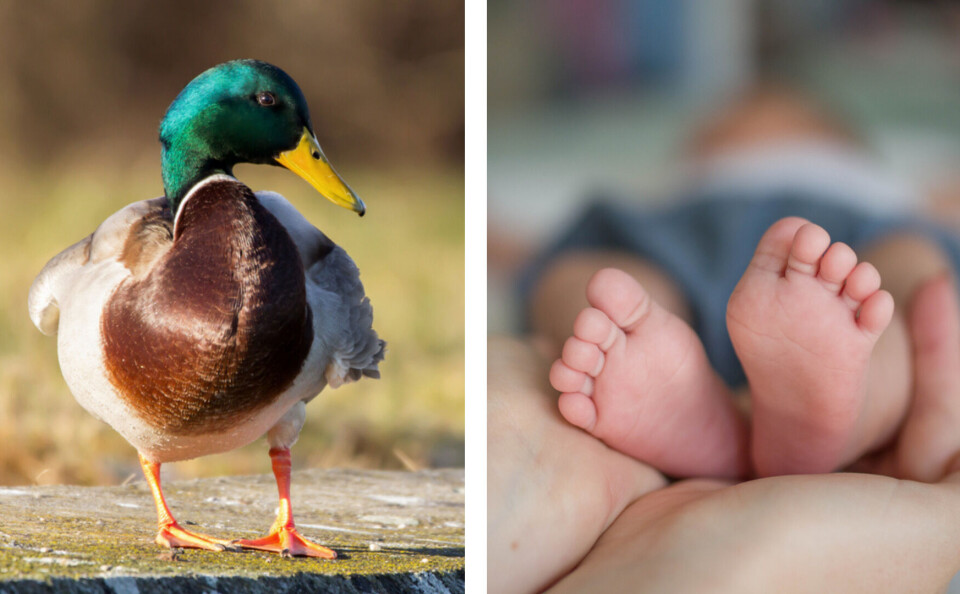-
Travellers risk extra costs under new Eurotunnel ticket rule
Some fare options are less flexible and less forgiving of lateness
-
May will be difficult month for train travel in France, warns minister
Two major train unions are threatening to strike and are ‘not willing to negotiate’, he says
-
Larousse dictionary adds 150 new French words - which ones do you know?
The new words come from trends in sport, nature, leisure, food, medicine, and the rest of the French-speaking world
French baby named ‘Canard’ is heir to tragic but proud family history
The name, which translates as ‘duck’, initially attracted criticism and scepticism but the baby’s grandfather has now revealed the true meaning

A couple in south-west France have been allowed to call their newborn son ‘Canard’ – meaning ‘duck’ in French – in honour of the family’s distinctive and proud, but somewhat tragic history.
Records from Périgueux (Dordogne) show that a couple in the town of Montpon-Ménestérol in Dordogne gave their son, who was born in 2021, the name Dyklan Canard.
Despite initial scepticism of the duck-related second name, local authorities changed their minds when they learned of the family connection to the name.
Amid much social media questioning, Jean-Christophe Bret-Canard, the grandfather of the baby, explained the story and reasoning behind the unusual name to France Bleu.
He said: “My mum was called Madame Georgette Canard, it was her family name [surname]. She was abandoned in 1943 during World War Two. She was part of a traveller community, and at this time, let’s just say they were not well-treated.
“So she was abandoned on the steps of a church and then placed in an orphanage, then adopted by Mr Georges Canard, which became her family name. And, out of respect for her, all four of my children have the second first name, Canard.”
The tradition has become a way to remember the Canard name, and pay homage to the man who adopted the then-young girl with a tragic past during a difficult time.
Georges Canard was a French soldier who worked on the railways, and was also involved in the French Resistance during the war.
Mr Bret-Canard continued: “When you know that your parents were exterminated, and that she [my mother] fought for me to succeed, coming from nothing…I have two sons who are gendarmes, and another son who has created his own business, and I’m proud.
“And anyway, everyone calls me Monsieur Canard.”
The name and symbol run like a thread throughout the family – Mr Bret-Canard’s tattoo parlour is named ‘Duck’, and his son’s business is called Locaduck. The tattoo artist also has tattoos of ducks on his arms and legs.
“It’s a sense of pride, almost like a coat of arms,” he said.
He added that using the name is also a way to enable Canard to continue throughout the family, as female surnames often get forgotten over the generations.
Mr Bret-Canard said that authorities were initially not in favour, but when he showed them his mother’s identity card, they understood, and “realised we weren’t making it all up”, he said.
It comes after BFMTV recently hosted a debate on whether parents should be banned from giving children odd or unusual names.
In France, you are allowed to change your surname via the mairie for a “legitimate reason”. But, to be accepted, the name must not be deemed “ridiculous or pejorative”, or be considered likely to cause daily problems for the named person.
France has a list of conditions for the first names and surnames of children on the service-public.fr website.
These include rules stating that the first name may not be something “contrary to the interests of the child”.
The rules also state that if the child has the surname of one of its parents, its first name cannot be the other parent’s surname (in some instances, however, it can be the middle name, as in this case).
Rows have broken out in recent years over certain first names, including a Breton couple who appealed against a ban on the traditional name Fañch (it was initially banned due to its accent); and two parents in 2015 who were ordered in court to change their daughters’ names from Nutella and Fraise to something “more sensible”.
Fraise (meaning strawberry) became Fraisine, a 19th-century, judge-approved “elegant” French name; while Nutella (the popular chocolate hazelnut spread) became known simply as Ella.
Related articles
Just three days to choose baby's name
Nutella and Fraise baby names banned
Couple vow to fight baby name ruling
























